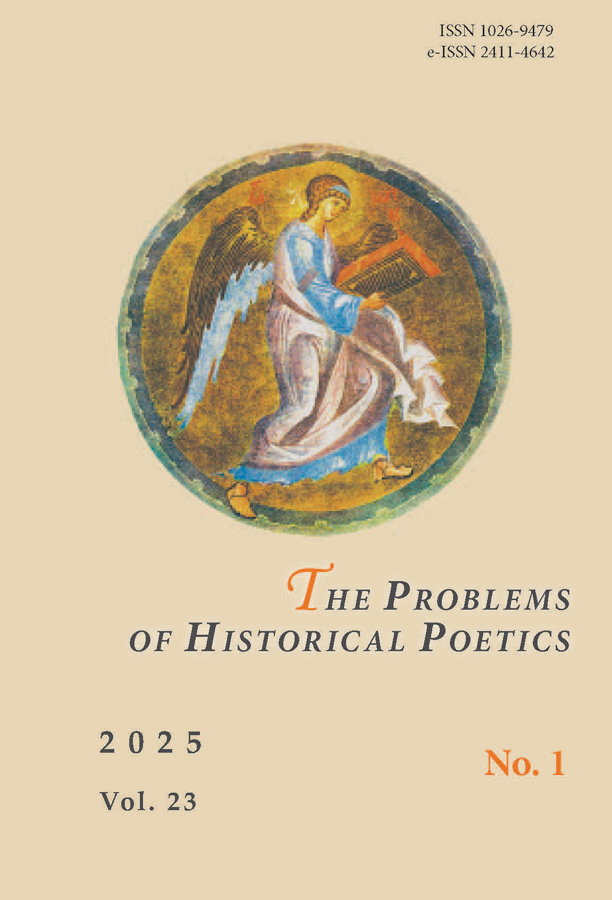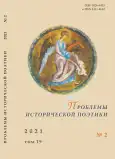The “Bright City” mythologeme in lyric poetry of Pimen Karpov
- Authors: Kokovina N.Z.1, Mikhailova I.P.1
-
Affiliations:
- Kursk State University
- Issue: Vol 19, No 2 (2021)
- Pages: 235-250
- Section: Articles
- URL: https://bakhtiniada.ru/1026-9479/article/view/284435
- DOI: https://doi.org/10.15393/j9.art.2021.9382
- ID: 284435
Cite item
Full Text
Abstract
The article analyzes the poet Pimen Karpov’s understanding of the “Bright City” mythologeme. The need to analyze this mythologeme stems from the fact that the image of the Bright City is at the core of the mythopoetic concept that forms the basis of Karpov’s worldview. The toponymy of the sacred space of the Bright City, the Heavenly City, the City of God in Karpov’s lyric poetry is multifaceted. It is realized in poetry both as a real earthly space, and as a certain symbol with blurry borders: it is a heavenly city, a potential paradise on earth, the promised land, the land of the forefathers, and even simply the land for the peasant. The ideal world order has both spatial and temporal reference points. According to Karpov, it is only possible to reach the Bright City through self-sacrifice. Out of pain and suffering, happiness is born, and this is the only possible way to attain the coveted Paradise. But for Karpov, it is not merely a personal path, but also Russia’s path, its mission, and the lyrical hero’s participation in its fate is undeniable. Karpov sees Russia’s historical mission in sacrificial self-immolation as a path to Transformation. The paradoxical convergence of Christ and the antichrist in his works reflects the spiritual context of the turn of the 20th century, i.e., the extreme ambivalence of personal principles. The fragmentary and aphoristic nature of Karpov’s poetic language, the kaleidoscopic nature of his artistic space, on the one hand, and the hidden integrity emanating from the unity of the visible and invisible worlds, on the other, make his poetry akin to the culture of modernism.
About the authors
N. Z. Kokovina
Kursk State University
Author for correspondence.
Email: natzak@rambler.ru
ORCID iD: 0000-0002-1792-2680
PhD (Philology), Professor of the Department of Russian literature
Russian Federation, KurskI. P. Mikhailova
Kursk State University
Email: mihailovairin@mail.ru
ORCID iD: 0000-0002-9995-9742
PhD (Philology), Associate Professor of the Department of Russian literature
Russian Federation, KurskReferences
- Vasil’eva I. V. Russian Literature of the Early 20th Century in the Context of Christian Culture. In: Russkiy yazyk i literatura v prostranstve mirovoy kul’tury: materialy XIII Kongressa Mezhdunarodnoy assotsiatsii prepodavateley russkogo yazyka i literatury (Granada, Ispaniya, 13–20 sentyabrya 2015 goda): v 15 tomakh [Russian Language and Literature in the Space of World Culture: Materials of the 13th Congress of the International Association of Teachers of Russian Language and Literature (Granada, Spain, September 13–20, 2015): in 15 Vols]. St. Petersburg, International Association of Teachers of Russian Language and Literature Publ., 2015, vol. 14, pp. 110–114. (In Russ.)
- Voronova O. E. Sergey Esenin i russkaya dukhovnaya kul’tura [Sergei Yesenin and Russian Spiritual Culture]. Ryazan, Uzoroch’e Publ., 2002. 498 p. (In Russ.)
- Gacheva A. G. «Ideal ved’ tozhe deystvitel’nost’…». Russkaya filosofiya i literatura [“The Ideal is also a Reality…” Russian Philosophy and Literature]. Moscow, Akademicheskiy proekt Publ., 2019. 734 p. (In Russ.)
- Kartashev A. V. The Meaning of the Old Belief. In: Tserkov’, 1992, no. 2, pp. 19–24. (In Russ.)
- Kokovina N. Z., Mikhailova I. P. The Anthropological Paradigm of the Provincial Text of the Early 20th Century (Based on the Works of Kursk Authors). In: II Vsemirnyy kongress v real’nom i virtual’nom rezhime «Vostok-Zapad: peresecheniya kul’tur». Japan, Kyoto, Kyoto Sangyo University [Second World Congress in Real and Virtual Mode “East-West: Intersections of Cultures”. Japan, Kyoto, Kyoto Sangyo University]. Kyoto, Tamaka Print Publ., 2019, vol. 2, pp. 109–114. (In Russ.)
- Mikhaylova I. P. To a Question of Regional Identity as a Way of Expressing the Author’s Position in the Works of the Writer Pimen Karpov. In: Samosoznanie i identichnost’. Russkaya literatura XVIII–XXI vv. [SelfAwareness and Identity. Russian Literature of the 18th and 21st Centuries]. München, Herbert Utz Verlag Publ., 2018, pp. 112–119. (In Russ.)
- Mikhalenko N. V. Spatial Organization of the Image of the Heavenly City in the Early Lyrics of Sergei Yesenin. In: Sergey Esenin i literaturnyy protsess: traditsii, tvorcheskie svyazi [Sergei Yesenin and the Literary Process: Traditions, Creative Connections]. Ryazan, Ryazanskiy izdatel’skiy dom Publ., 2006, pp. 105–116. (In Russ.)
- Ponomareva T. A. Khudozhestvennyy mir novokrest’yanskoy literatury [The Artistic World of New Peasant Literature]. Moscow, Moscow State Pedagogical University Publ., 2017. 182 p. (In Russ.)
- Rozhdestvenskaya M. V. The Image of the Holy Land in Old Russian Literature. In: Ierusalim v russkoy kul’ture [Jerusalem in Russian Culture]. Moscow, Nauka Publ., 1994, pp. 8–14. (In Russ.)
- Seregina S. A. Images of Poetic Utopia in the Works of Andrei Bely and Sergei Yesenin. In: Solov’evskie issledovaniya, 2015, no. 3 (47). pp. 115–129. (In Russ.)
- Solntseva N. M. Kitezhskiy pavlin: filologicheskaya proza. Dokumenty. Fakty. Versii [Kitezhsky Peacock. Philological Prose. Documents. Data. Versions]. Moscow, Skify Publ., 1992. 423 p. (In Russ.)
- Shakhmatova E. V. Mifologema «Vostok» v filosofsko-ezotericheskom kontekste kul’tury Serebryanogo veka [Mythologeme “East” in the Philosophical and Esoteric Context of the Culture of the Silver Age]. Moscow, Akademicheskiy proekt Publ., 2020. 413 p. (In Russ.)
Supplementary files











